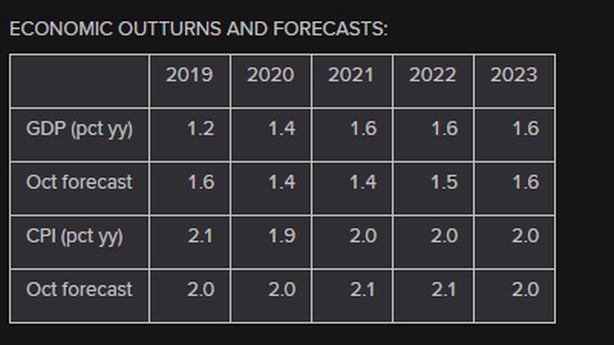Brexit is casting a "cloud of uncertainty" over the British economy, Chancellor Philip Hammond admitted, after MPs rejected Theresa May's deal and the Budget watchdog slashed growth forecasts.
The British Finance Minister said the Office for Budget Responsibility has forecast growth of 1.2% this year - a downgrade from the 1.6% forecast at the Budget in 2018.
Delivering his Spring Statement, Mr Hammond said: "Last night's vote leaves a cloud of uncertainty hanging over our economy. And our most urgent task in this House is to lift that uncertainty."
But he insisted the economy remained "remarkably robust".
The OBR forecast growth of 1.2% this year, 1.4% next year and 1.6% in the following three years.
"Cumulative growth over the five years is now slightly higher than the Budget forecast," Mr Hammond said.
Philip Hammond also said he could free billions of pounds for extra public spending or tax cuts if parliament resolves its Brexit impasse.
Hammond told politicians he would be able to relax his grip on the public finances if they spared Britain the shock of leaving the world's biggest trading bloc without an agreement.
But he warned that the progress Britain has made on cutting its borrowing would be at risk without an orderly exit from the European Union with a transition period.
"I hoped we would do that last night, but I am confident that we, as a House, will do it over the coming weeks."

Parliament last night rejected Prime Minister Theresa May's proposed Brexit plan for a second time, little more than two weeks before the scheduled date of departure from the EU.
"Leaving with no deal would mean significant disruption in the short and medium term and a smaller, less prosperous economy in the long term, than if we leave with a deal," Mr Hammond said in his speech to parliament.
"Higher unemployment, lower wages, higher prices in the shops. That is not what the British people voted for in June 2016," he said.
MPs were expected to vote later today against a no-deal Brexit and then vote on Thursday in favour of the government seeking a delay to Britain's departure, currently scheduled for March 29.
New half-yearly fiscal forecasts showed that Britain's public finances, at least in the short term, were in better shape than in October, when Philip Hammond gave an annual budget statement, despite a weaker outlook for the country's economy.
Mr Hammond said he now had £26.6 billion of fiscal "headroom" that he has earmarked as a potential war chest for helping Britain's economy - for example, via extra spending or tax cuts - up from a previous estimate of £15.4 billion.
In his full budget statement in October, Hammond also held out the prospect of higher spending or tax cuts if parliament backed the government's Brexit plan.
The UK parliament rejected that plan in January and again on Tuesday.

